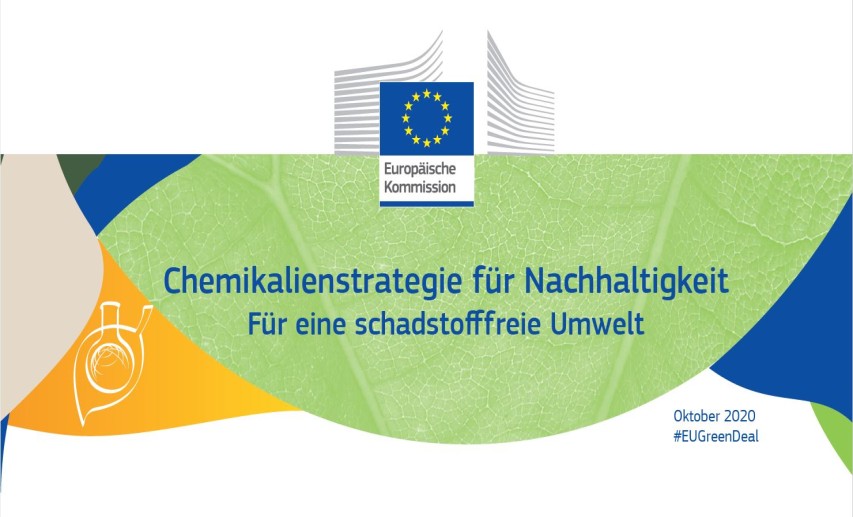09 November 2020 | Position
LanguageDEDownloads
-
VCI position on Chemicals Strategy for Sustainability
PDF | 261 kB | Version as of: 09 November 2020
In mid-October 2020, the EU Commission published its Communication “Chemicals Strategy for Sustainability – Towards a Toxic-Free Environment”. This brings major changes for the chemical industry and the users of chemicals.

The chemicals strategy is part of the Green Deal whose primary goal is to bring about climate neutrality for Europe by 2050.The implementation of the chemicals strategy with over 50 measures will have far-reaching consequences for the chemical industry and the users of chemical products.
- It is planned to amend and tighten the REACH Regulation, the CLP Regulation and numerous other provisions. These include far-reaching new data requirements, use restrictions and comprehensive regulation of groups of substances with certain properties, as well as the incorporation of new hazard classes in the CLP Regulation.
- Further rules on products (e.g. cosmetics, detergents, food contact materials) and on environmental protection and occupational health and safety are also affected. Overall, the whole chemicals legislation is to be given a much more hazard-based orientation.
Thus, in addition to the current economic crisis caused by COVID-19, the chemical industry and the users of its products are facing uncertain and difficult times.
VCI‘s position on the new EU Chemicals Strategy
The VCI supports the Green Deal's goal to achieve climate neutrality by 2050 and the approach to make the economy, society and politics in Europe more sustainable. With innovative solutions and processes, the chemical and pharmaceutical industry can and wants to actively contribute to achieving the ambitious goals – such as medical progress, digitalisation, climate protection or electromobility. Only a strong chemical industry can ensure the path to climate neutrality and resilience of the European Union against future crises that are unforeseeable today.
For enabling the chemical industry to make a maximum contribution to the Green Deal objectives, the industry needs the right framework conditions:
Stability and planning reliability needed
- The EU’s existing legislation on chemical substances and products recognizably ranks among the most comprehensive and protective regulatory frameworks, supported by the most advanced knowledge base globally. What has been achieved must not be jeopardized by now opening many proven legislations in lengthy law-making processes with uncertain outcomes.
- In principle, the primary objectives of the Chemicals Strategy – i.e., to protect humans and the environment and to promote safe and sustainable chemicals – can already be achieved within the existing legislative framework
- Stability and reliable planning are now necessary to overcome the crisis and to safeguard strategic products and processes in Europe. The economic management of the current crisis must not be slowed down for years to come.
Criteria for safe and sustainable chemicals must include all dimensions of sustainability
- For further improvements, a holistic approach is needed that takes into account the entire life cycle and all dimensions of sustainability: ecological, social, and economic. Sustainability is not an inherent property of a substance and criteria for sustainable chemicals must therefore not be reduced to such parameters.
- The well-proven concept of risk assessment must be maintained for all substances. VCI is highly critical of the primarily hazard-based approach proposed in the Chemicals Strategy, which the Commission calls the "generic approach to risk management” and which provides for a general ban of certain substances without risk assessment and public consultation.
No sustainability and no innovation without hazardous substances
- Innovation, production of sustainable products and value creation must continue to take place in Europe, 1.2 million jobs must remain in the EU. If possible, important productions should return to Europe. This cannot be done without substances classified as hazardous.
- Sustainability and hazardous substances are not mutually exclusive. Especially the functionality or reactivity of chemical substances required for certain uses and processes is often inseparably linked to the hazardous property.
- Thus, it is important to strengthen the safe and sustainable use of classified substances and as well to identify and eliminate specific, unacceptable risks.
Constructive dialogue and impact assessment needed
- From VCI's viewpoint, the high-level roundtable with all stakeholders announced in the Chemicals Strategy is now particularly important. A constructive and open-ended dialogue is urgently needed before making concrete proposals for amending existing legislation.
- Moreover, comprehensive impact assessments beyond planned legislative steps are necessary for all measures under the Chemicals Strategy.
The complete position paper with more details and an assessment of individual aspects of the Chemicals Strategy (5 pages) can be found in the download area at the header of this page.
Service:
- Communication of the European Commission “Chemicals Strategy for Sustainability – Towards a toxic-free environment”
Contact
For questions or suggestions, please feel free to contact us.
Dr. Angelika Hanschmidt
Europäische Chemikalienpolitik, EU-Chemikalienstrategie, REACH
- E-mail: hanschmidt@vci.de

Dr. Michael Lulei
Abteilungsleitung Produktsicherheit, Internationale Chemikalienpolitik, Produkt- und Chemikaliensicherheit
- E-mail: lulei@vci.de